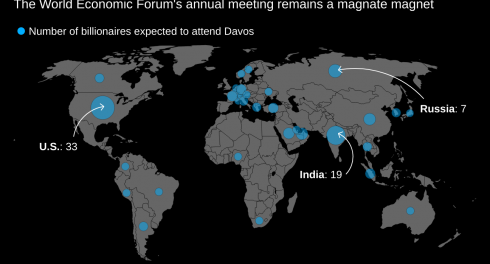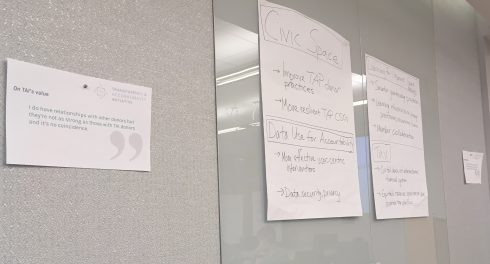Highlights:
- Time to go classical?
- Here at last
- Taxing questions
- Expanded view of evidence
- TAI spotlight: From fiscal sponsorship and driving change
In case you missed it…
Time to go classical?
 Photo: TAI
Photo: TAI
We don’t cite from Classics professors for the TAI Weekly, but Matthew Sears has us thinking about accountability. Specifically, is it past time to revive the Greek practice of “euthyna” whereby, at the end of their terms, public officials faced an audit of their time in office by a committee of citizens? If they found cause, the committee could refer the official to the courts. Any brave volunteers to adopt at next week’s OGP Summit?
Sears also reminds us that the question of if/how to hold votes accountable for the electoral choices they make has been around for some two thousand years. The ancient Greeks never found a satisfactory solution, but should we be rethinking in a context where harsh rhetoric is translating into all too real action. Take former open gov champion, Tanzania, where critics say President Magufuli has rapidly stifled civic space in the country. How to change this scenario?
What to do? Lauren L. Finch from MobLab argues that protecting civic space will require a lot of courage, accountability and time investment, and caring and trustworthy relationships with people. Pair this with a new action guide, SNAP courtesy of the United States Institute of Peace. Its designed to help in building bridges between peacebuilding and nonviolent action practitioners. Or, sample Open Democracy’s upcoming field-tested resource of materials, frameworks and more for government and civic actors aiming to counter populist narratives.
More generally, benefit from Blueprints for Change, an open library of advocacy how-to’s put together by campaign innovators to help progressive organizers and groups up their game more quickly. Plus, for those seeking to push change within government, think of joining Apolitical, a global community of civil servants. Apolitical aims to connect civil servants and experts to promote their work, solve problems, and learn about new findings and programs around the world.
Last week we highlighted some new developments on how AI and use of fact checking can be used to combat dis or misinformation. Is fact checking really enough to contain the most viral content? Poynther argues that it’s promising but there is need for more credible efforts aimed at increasing the penetration of facts across the internet.
Essential Watching
For those not able to go to the OGP Summit in Ottawa (and we know there are many of you), here’s a chance to hear OGP CEO Sanjay Pradhan share intriguing stories about the importance of building coalitions between governments and civil society to strengthen democracy beyond elections. Watch Now!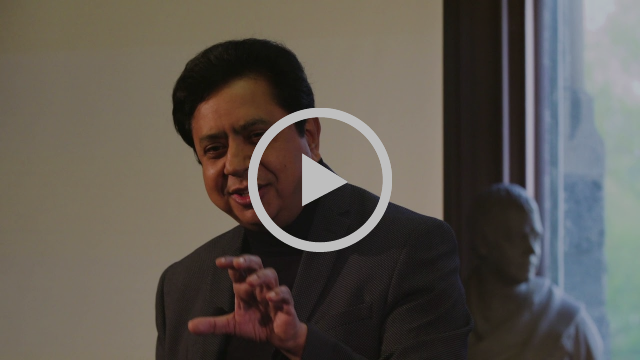
Here at last
A true labor of love, The State of Open Data: Histories and Horizons is finally out in the world – all 37 chapters looking at the past, present and future of data work (including the donor chapter authored by TAI’s own Michael Jarvis with Fernando Perini) Read the background here.
In parallel development, TAI member Luminate had commissioned its own scan of both ten years of open data funding and ten years of funding civic tech work. The latter is featured on Micah Sifrey’s new Micro Clues, a collation of threads on the civic tech world. Lot of gems hidden there.
Civic tech and open data evangelists are getting much more sensitive to some of the ethical and practical risks of data sharing, especially for vulnerable groups, but with more to do. How can donors help to support responsible data collection and use? Linda Raftree argues they should enhance awareness of fellow donors to the risks and encourage responsible data practices by grantees. For their inspiration, here’s a curated list of responsible data resources by MERL Tech and The Engine Room. They include examples of discussions, case studies, policies, and more. Want a real-world issue where the risks are evident? Read this new paper by Dragana Kaurin from the World Refugee Council analyzing how the vast amount of data collected from refugees is used and the risks such a collection process poses to these vulnerable group. Meanwhile, several big tech companies are providing digital identity technology to track increased numbers of refugees.
In general, are companies doing enough on managing data privacy? Likely not – Ranking Digital Rights just released the 2019 Ranking Digital Rights Corporate Accountability Index evaluating 24 of the world’s most powerful tech companies and internet providers on their disclosure of commitments, policies, and practices around privacy and freedom of expression. Most companies fell short on privacy, expression and governance. Top of the list? Microsoft. Check out how different companies performed and recommendations for various stakeholders.
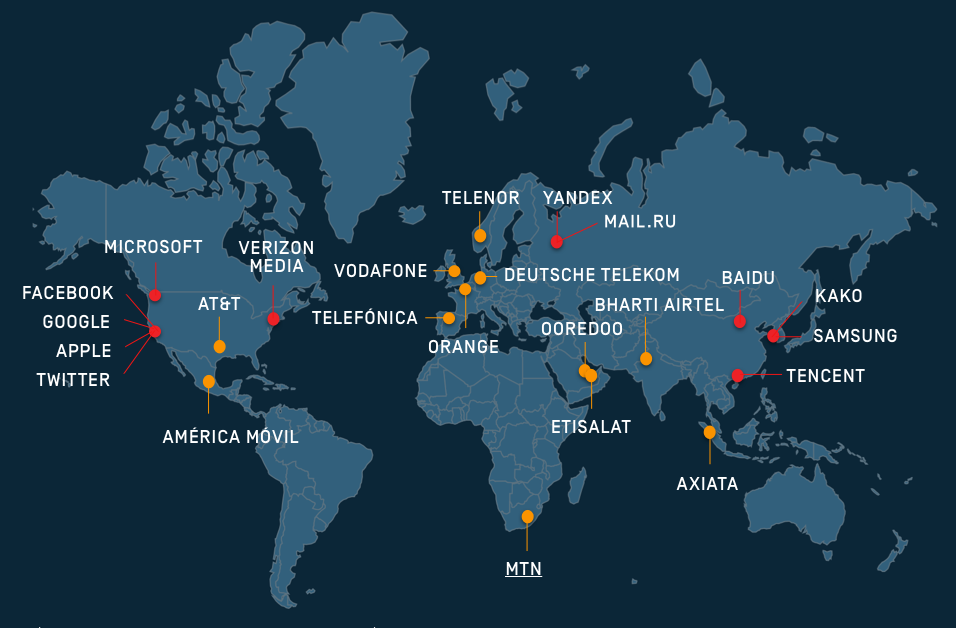 Photo: Ranking digital rights
Photo: Ranking digital rights
Taxing questions
Talking of big tech practices, are social media taxes an effective tool in data regulation? A new report from Centre for International Media Assistance argues it isn’t and demonstrates how charging individual users a tax to social media platforms has negatively impacted the Ugandan news media ecosystem. Internet penetration in Uganda has dropped from 47% to 35%, user engagement through social media has waned, and many users are finding ways to evade the tax. What of the big tech companies? Paul Romer, Nobel Prize-winning economist, argues that instead of taxing the likes of Facebook and Google, regulators should impose a large tax on advertisements on the platforms, to discourage such widescale data collection.
Moving on now to combatting tax evasion and illicit financial flows. Panama recently voted in a new president, Laurentino Cortizo, who has promised to root out corruption and address inequality. No easy task – hopefully Open Society Foundation’s forthcoming consultancy to marshal responses for reform opportunities can help.
In Germany, prosecutors, police and tax inspectors raided the offices of several banks, financial advisers and wealthy individuals as part of a criminal probe into those suspected of tax evasion. The raid was triggered by International Consortium of Investigative Journalists’ 2013 Offshore Leaks investigation. At the same time, Deutsche Bank are attracting scrutiny for their failure to follow through on creating suspicious activity reports related to red flagged activities in Trump and Kushner accounts.
Want a more systemic solution? Watch UN debates on the merits of everything from public country-by-country reporting to best practice in asset recovery and repatriation – helpfully package in part one and two (not the easiest to watch straight through). We can see how they match up with leading civil society views as TAI sits in on a convening of tax transparency groups in Oslo this week. One opportunity for revenue authorities is to take better advantage of the growing volume of corporate ownership data to help flag tax avoidance, so tax groups might want to cheer the creation of the Executive Director role at Open Ownership and welcome Thom Townsend to the role – transferring from the UK government.
OGP is not the only multi-stakeholder initiative with an upcoming Summit. Acolytes of the Extractive Industries Transparency Initiative will soon be gathering in Paris on June 18 and 19. Perhaps that is prompting member countries to highlight their achievements, for example Iraq is now set to be more transparent on their EITI commitments. Additionally, Iraq will be conducting their second validation and are already exploring innovative ways of collecting gender-disaggregated data. Likewise, Chad is making progress in publishing contract transparency and commodity payments. However, validation results noted growing restrictions of the space for civil society since 2015. Finally, Germany is already leading by example. They have met all requirements and are set to embrace routine disclosures and innovate further.
Expanded view of evidence
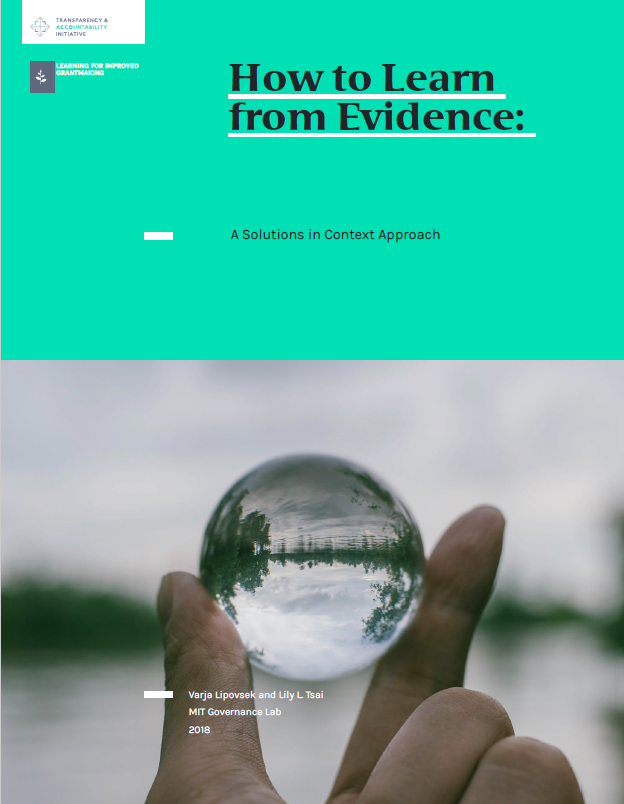 Many funders including TAI Members are now thinking more expansively about evidence as they strive to understand the world of today and to improve the world of tomorrow (don’t forget to check out our new Solutions in Context guidance blog and report). There is need for a more expanded view of evidence which is called developmental evidence. USAID provides guidance on how to manage barriers and promote enablers that influence the implementation of a developmental evaluation. First, help launch the evaluation and then plant the seed of evaluation. Check more tips.
Many funders including TAI Members are now thinking more expansively about evidence as they strive to understand the world of today and to improve the world of tomorrow (don’t forget to check out our new Solutions in Context guidance blog and report). There is need for a more expanded view of evidence which is called developmental evidence. USAID provides guidance on how to manage barriers and promote enablers that influence the implementation of a developmental evaluation. First, help launch the evaluation and then plant the seed of evaluation. Check more tips.
Ever thought the research and evidence you are collecting with and on your grantees risks fueling inequity, resentment and suspicion? Michael Theis offers a new guide for grant makers, community-focused nonprofits, and the researchers to avoid this and help change the approach to research. Bottom line – donors and charities should engage the communities they hope to impact and share the results of studies with members of the group that was examined.
Finally, do you do check-ins in your organization? TAI team does them twice a week and agree with Eugene Kim and Kate Wing’s views that their frequency leads to efficiency and depth. They also support accountability to take commitments to action.
TAI spotlight
To be fiscally sponsored or not to be | TAI
Michael Jarvis, TAI Executive Director and Jenny Lah, Independent Consultant share what they have learned about fiscal sponsorship and what it entails.
Learning to learn as a collaborative | TAI
Varja Lipovsek, research scientist at the MIT Governance Lab and Karen Hussman from Dejusticia highlight what has happened in the first year of the Learning Collaborative.
Driving change when we’re Menlo parked | Hewlett Foundation
Ruth Levine shares the Foundation’s experience of doing international grantmaking without country offices.
Advancing our understanding of the impacts of algorithmic systems | Luminate
While many good algorithms have come into our lives, there are others that increase power asymmetries between the users and the deciders
Assess your organizational readiness | MacArthur Foundation
Kristen J. Molyneaux shares their new organizational readiness tool to help applicants determine if their project to solve one of the world’s most pressing problems is a good fit for the 100&Change competition.
For a better future, Sudan must confront its past | Open Society Foundation
Ezzaddean El Safi argues that for a better Sudan the country needs to confront its past and elect a representative government that addresses injustice.
Calls: Proposals, papers, speakers and course invites
- Crowdsourcing case studies for the Innovation Report for 2019 on Civil Society – May 31
- Hewlett Foundation’s Call for Proposals to Coordinate Global Research, Learning, and Norms for Participatory Budgeting – May 31
- OSF Consultancy: Scoping Learning Needs during Anti-corruption Learning Opportunity – June 3
- Call for Applications: 100&Change: July 16
- OECD Questionnaire for Youth Organisations – June 21
On the calendar
- Free Webinar: The Think Tank – Funder relationship – May 22
- Policy Dialogue Day 2019 – May 22, 2019 (Gothenburg, Sweden)
- The 2019 Media Impact Forum: Radio Active Culture – May 23, 2019 (Philadelphia, USA)
- Mandates for Change: Anticorruption and Latin America’s New Leaders – May 23, 2019 (Washington, DC)
- The New Global Activism (Algeria, Sudan, and Beyond) – May 28, 2019 (Washington, DC)
- 2019 Open Government Partnership Global Summit – May 29-31, 2019 (Ottawa, Canada)
- Women Deliver 2019 Conference – June 3- 6, 2019 (Vancouver, Canada)
- RightsCon Tunis – June 11-14, 2019 (Tunis, Tunisia)
- InterAction Forum 2019 – June 11-13, 2019 (Washington, DC)
- Global Conference on Transparency Research – June 26 – 27, 2019 (Rio de Janeiro, Brazil)
- Tax Justice Network Conference 2019 – July 2 -3, 2019 (City, University of London, UK)
- ATI/ITC Tax and Development Conference 2019 – July 2 -4, 2019 (Berlin, Germany)
- IDEAS 2019 Global Assembly and Third International Conference on Evaluating Environment and Development – September 30 – October 4, 2019 (Prague, Czech Republic)
- Global Symposium (COPGS) on Citizenship, Governance, and Accountability in Health – October 15-18, 2019 (New Delhi, India)
- What Works Global Summit 2019: Building Evidence – October 16 – 18, 2019 (Mexico City, Mexico)
- Global Perspectives 2019 – October 29 – November 1, 2019 (Addis Ababa, Ethiopia)
